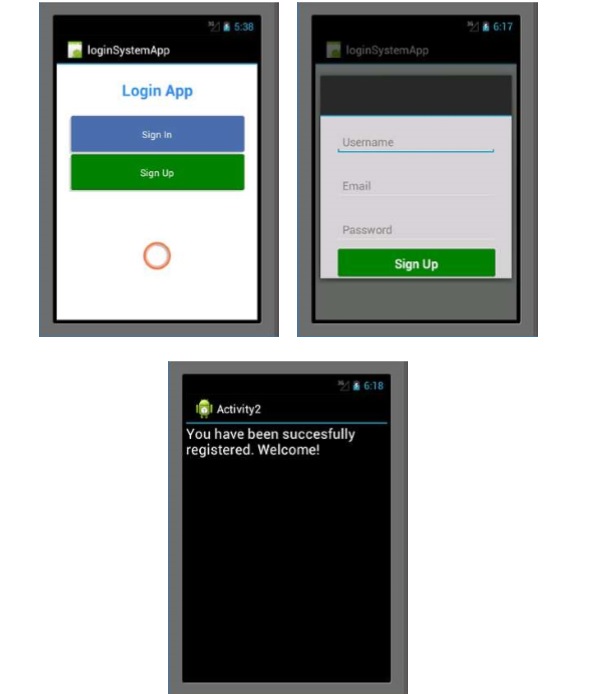Xamarin - แอพ Multiscreen
ในบทนี้เราจะสร้างระบบล็อกอินที่ช่วยให้ผู้ใช้สามารถลงทะเบียนได้ จากนั้นเราจะนำผู้ใช้ที่ลงทะเบียนไปที่หน้าจอหลักของแอพของเราเมื่อเข้าสู่ระบบสำเร็จ
ก่อนอื่นให้สร้างโครงการใหม่และเรียกมันว่า Login System. ในโปรเจ็กต์ใหม่ของคุณไปที่main.axml และเพิ่มปุ่มสองปุ่มและแถบความคืบหน้าตามที่แสดงด้านล่าง
<?xml version = "1.0" encoding = "utf-8"?>
<LinearLayout xmlns:android = "http://schemas.android.com/apk/res/android"
android:orientation = "vertical"
android:layout_width = "fill_parent"
android:layout_height = "fill_parent"
android:background = "@android:color/background_light"
android:weightSum = "100"
android:minWidth = "25px"
android:minHeight = "25px">
<TextView
android:text = "Login App"
android:textAppearance = "?android:attr/textAppearanceMedium"
android:layout_width = "match_parent"
android:layout_weight = "20"
android:layout_height = "0dp"
android:textColor = "#368DEB"
android:id = "@+id/txtCreatAccount"
android:gravity = "center"
android:textStyle = "bold"
android:textSize = "25sp" />
<Button
android:text = "Sign In"
android:layout_width = "match_parent"
android:layout_weight = "15"
android:layout_height = "0dp"
android:background = "@drawable/btnSignInStyle"
android:id = "@+id/btnSignIn"
android:layout_marginLeft = "20dp"
android:layout_marginRight = "20dp"
android:textSize = "15sp" />
<Button
android:text = "Sign Up"
android:layout_width = "match_parent"
android:layout_weight = "15"
android:layout_height = "0dp"
android:background = "@drawable/btnSignUpStyle"
android:id = "@+id/btnSignUp"
android:layout_marginLeft = "20dp"
android:layout_marginRight = "20dp"
android:textSize = "15sp" />
<RelativeLayout
android:layout_width = "match_parent"
android:layout_height = "0dp"
android:layout_weight = "50"
android:minWidth = "25px"
android:minHeight = "25px">
<ProgressBar
android:layout_width = "wrap_content"
android:layout_height = "wrap_content"
android:id = "@+id/progressBar1"
android:background = "@drawable/progressBarStyle"
android:layout_centerInParent="true"
android:indeterminate = "true"
xmlns:tools = "
http://schemas.android.com/tools"
tools:visibility = "invisible" />
</RelativeLayout>
</LinearLayout>หลังจากสร้างอินเทอร์เฟซผู้ใช้แล้วสิ่งสำคัญคือต้องจัดรูปแบบปุ่มเพื่อให้ดูน่าสนใจยิ่งขึ้น ในการดำเนินการนี้ให้สร้างไฟล์ XML ใหม่ภายใต้drawable folder และตั้งชื่อไฟล์เป็น btnSignInStyle.xml.
ในไฟล์ XML ให้เพิ่มโค้ดบรรทัดต่อไปนี้ -
<selector xmlns:android = "http://schemas.android.com/apk/res/android">
<item android:state_pressed = "false">
<layer-list>
<item android:right = "5dp" android:top = "5dp">
<shape>
<corners android:radius = "2dp"/>
<solid android:color = "#D6D6D6"/>
</shape>
</item>
<item android:left = "2dp" android:bottom = "2dp">
<shape>
<corners android:radius = "4dp"/>
<gradient android:angle = "270"
android:endColor = "#486EA9" android:startColor = "#486EA9"/>
<stroke android:width = "1dp" android:color = "#BABABA"/>
<padding android:bottom = "10dp"
android:right = "10dp" android:left = "10dp" android:top = "10dp"/>
</shape>
</item>
</layer-list>
</item>
<item android:state_pressed = "true">
<layer-list>
<item android:right = "5dp" android:top = "5dp">
<shape>
<corners android:radius = "2dp"/>
<solid android:color = "#D6D6D6"/>
</shape>
</item>
<item android:left = "2dp" android:bottom = "2dp">
<shape>
<corners android:radius = "4dp"/>
<gradient android:angle = "270"
android:endColor = "#79C791" android:startColor = "#486EA9"/>
<stroke android:radius = "4dp" android:color = "#BABABA"/>
<padding android:bottom = "10dp"
android:right = "10dp" android:left = "10dp" android:top = "10dp"/>
</shape>
</item>
</layer-list>
</item>
</selector>รหัสด้านบนจะกำหนดสีของปุ่มเมื่อโหลดและเมื่อคลิกมันจะกำหนดรัศมีขอบของปุ่มด้วย
ต่อไปเราจะสร้าง XML สไตล์ที่คล้ายกันดังที่กล่าวมาข้างต้นสำหรับไฟล์ signupปุ่ม. ในการดำเนินการนี้ให้สร้าง XML อื่นภายใต้drawable โฟลเดอร์และเรียกมัน btnSignUpStyle.xml. มันจะสืบทอดทุกอย่างจากbtnSignInStyle.xml. ความแตกต่างเพียงอย่างเดียวคือการไล่ระดับสีเริ่มต้นและสีสิ้นสุดของปุ่ม
เปลี่ยน startColor และ endColor ใน btnSignUpStyle.xml ถึง
<gradient android:angle="270"
android:endColor="#008000" android:startColor="#008000"/>ไปที่ layout folderและสร้างไฟล์ AXML ใหม่และเรียกมันว่า registerDailog.axml ไฟล์นี้จะมีรายละเอียดการลงทะเบียนสำหรับผู้ใช้ใหม่ในแอพของเรา หน้านี้จะมีสามEditTextsและปุ่มสำหรับส่งข้อมูล เพิ่มรหัสต่อไปนี้ภายในรหัสโครงร่างเชิงเส้นของคุณ
<EditText
android:layout_width = "match_parent"
android:layout_marginBottom = "10dp"
android:layout_marginTop = "25dp"
android:layout_marginRight = "25dp"
android:layout_marginLeft = "25dp"
android:layout_height = "35dp"
android:paddingLeft = "10dp"
android:id = "@+id/txtUsername"
android:hint = "Username"
android:textColor = "#000" />
<EditText
android:layout_width = "match_parent"
android:layout_height = "35dp"
android:id = "@+id/txtEmail"
android:layout_marginBottom = "10dp"
android:layout_marginTop = "25dp"
android:layout_marginRight = "25dp"
android:layout_marginLeft = "25dp"
android:paddingLeft = "10dp"
android:textColor = "#000"
android:hint = "Email" />
<EditText
android:layout_width = "match_parent"
android:layout_height = "35dp"
android:layout_marginBottom = "10dp"
android:layout_marginTop = "25dp"
android:layout_marginRight = "25dp"
android:layout_marginLeft = "25dp"
android:paddingLeft = "10dp"
android:textColor = "#000"
android:id = "@+id/txtPassword"
android:hint = "Password" />
<Button
android:text = "Sign Up"
android:layout_width = "match_parent"
android:layout_height = "wrap_content"
android:id = "@+id/btnSave"
android:textSize = "20dp"
android:textColor = "#fff"
android:textStyle = "bold"
android:height = "70dp"
android:background = "@drawable/btnSignUpStyle"
android:paddingLeft = "5dp"
android:paddingRight = "5dp"
android:paddingTop = "5dp"
android:paddingBottom = "5dp"
android:layout_marginLeft = "25dp"
android:layout_marginRight = "25dp"
android:layout_centerHorizontal = "true" />จากนั้นเพิ่มคลาสใหม่ที่เรียกว่า signUpDialog.cs. คลาสนี้จะมีรหัสที่จำเป็นในการสร้างกล่องโต้ตอบ ตัวอย่างต่อไปนี้แสดงรหัส
public class OnSignUpEvent:EventArgs {
private string myUserName;
private string myEmail;
private string myPassword;
public string UserName {
get {
return myUserName;
}
set{
myUserName = value;
}
}
public string Email {
get {
return myEmail;
}
set {
myEmail = value;
}
}
public string Password {
get {
return myPassword;
}
set {
myPassword = value;
}
}
public OnSignUpEvent(string username, string
email, string password):base() {
UserName = username;
Email = email;
Password = password;
}
class SignUpDialog:DialogFragment {
private EditText txtUsername;
private EditText txtEmail;
private EditText txtPassword;
private Button btnSaveSignUp;
public event EventHandler<OnSignUpEvent> onSignUpComplete;
public override View OnCreateView(LayoutInflater inflater,
ViewGroup container, Bundle savedInstanceState) {
base.OnCreateView(inflater, container, savedInstanceState);
var view = inflater.Inflate(Resource.Layout.registerDialog, container, false);
txtUsername = view.FindViewById<EditText>(Resource.Id.txtUsername);
txtEmail = view.FindViewById<EditText>(Resource.Id.txtEmail);
txtPassword = view.FindViewById<EditText>(Resource.Id.txtPassword);
btnSaveSignUp = view.FindViewById<Button>(Resource.Id.btnSave);
btnSaveSignUp.Click += btnSaveSignUp_Click;
return view;
}
void btnSaveSignUp_Click(object sender, EventArgs e) {
onSignUpComplete.Invoke(this, new OnSignUpEvent(txtUsername.Text,
txtEmail.Text, txtPassword.Text));
this.Dismiss();
}
}
}ในโค้ดด้านบนเราได้ใช้ไฟล์ get และ setคุณสมบัติ. get วิธีการคืนค่าตัวแปรในขณะที่ setวิธีการกำหนดค่าให้กับตัวแปรที่ส่งคืน นี่คือตัวอย่าง -
public string Color {
get {
return color;
}
set {
color = value;
}
}ในตัวอย่างก่อนหน้านี้เราได้สร้างเมธอดที่แทนที่มุมมอง ภายในเมธอดเราได้สร้างไฟล์var เรียกว่า view ซึ่งอ้างอิงถึงไฟล์ registerDialog.axml อยู่ในโฟลเดอร์เค้าโครง
จากนั้นไปที่ mainActivity.cs เพื่อสร้างส่วนโต้ตอบ
private Button signUp;
private Button submitNewUser;
private EditText txtUsername;
private EditText txtEmail;
private EditText txtPassword;
protected override void OnCreate(Bundle bundle) {
base.OnCreate(bundle);
SetContentView(Resource.Layout.Main);
signUp = FindViewById<Button>(Resource.Id.btnSignUp);
submitNewUser = FindViewById<Button>(Resource.Id.btnSave);
txtUsername = FindViewById<EditText>(Resource.Id.txtUsername);
txtEmail = FindViewById<EditText>(Resource.Id.txtEmail);
txtPassword = FindViewById<EditText>(Resource.Id.txtPassword);
signUp.Click += (object sender, EventArgs args) => {
FragmentTransaction transFrag = FragmentManager.BeginTransaction();
SignUpDialog diagSignUp = new SignUpDialog();
diagSignUp.Show(transFrag, "Fragment Dialog");
diagSignUp.onSignUpComplete += diagSignUp_onSignUpComplete;
};
}
void diagSignUp_onSignUpComplete(object sender, OnSignUpEvent e) {
StartActivity(typeof(Activity2));
}โค้ดด้านบนประกอบด้วยเหตุการณ์การคลิกปุ่มซึ่งเมื่อคลิกจะโหลดกล่องโต้ตอบการลงชื่อสมัครใช้ ภายในคลิกปุ่มเราได้สร้างไฟล์SignUpDialog คลาสซึ่งโหลดไฟล์ registerDialog.axml ไฟล์.
จากนั้นเราก็นำมาใช้ FragmentTransaction transFrag = FragmentManager.BeginTransaction(); เพื่อแสดงไฟล์ registerDialog หน้าเป็น Android Dialog Fragment
เราจะเพิ่มอีก .axml เรียกว่าไฟล์ home.axml. เค้าโครงนี้จะเป็นหน้าจอเริ่มต้นเมื่อผู้ใช้เข้าสู่ระบบสำเร็จ ภายในเลย์เอาต์นี้เราจะเพิ่ม textview ดังที่แสดงในโค้ดต่อไปนี้
<TextView
android:text = "You have been succesfully registered. Welcome!"
android:textAppearance = "?android:attr/textAppearanceLarge"
android:layout_width = "match_parent"
android:layout_height = "wrap_content"
android:id = "@+id/textView1" />ต่อไปเราจะสร้างกิจกรรมสุดท้ายที่เรียกว่า Activity2.cs. ในกิจกรรมนี้เราจะพบกับไฟล์home.axml โดยใช้ findViewById.
สุดท้ายสร้างและเรียกใช้แอปของคุณ จะแสดงหน้าจอต่อไปนี้เป็นเอาต์พุต
